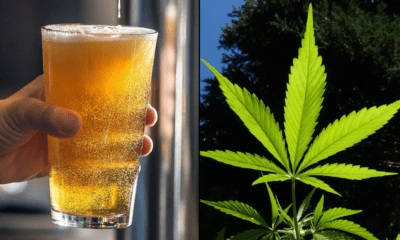Politics
California Officials Award $20 Million In Marijuana Research Grants To Study ‘Legacy’ Genetics, Preventing Monopolies And More

California marijuana regulators announced on Tuesday that they’ve awarded nearly $20 million in research grants to 16 academic institutions to carry out studies into cannabis, including novel cannabinoids like delta-8 THC and the genetics of “legacy” strains from the state.
The research projects being funded by the California Department of Cannabis Control (DCC) with marijuana tax revenue fall under six categories: cannabis potency, medical usage, marijuana industry health, monopolies and unfair competition, California legacy genetics and miscellaneous studies.
“It is the Department’s aspiration that these studies will advance the body of scientific research, further our understanding of cannabis, and aid to the continued development and refinement of the legal framework,” Rasha Salama, chief deputy director at DCC, said in a press release.
“These studies will provide valuable insights on topics of interest to California’s consumers, businesses, and policy makers and the Department looks forward to sharing them once they are completed,” she said.
The California Department of Cannabis Control awarded $20 million in research grants to 16 academic institutions. Read more here: https://t.co/jWjRVuVoOI pic.twitter.com/7RWWAxC2wo
— CA Department of Cannabis Control (@CAcannabisdept) April 25, 2023
This is the second round of academic marijuana grants that DCC is distributing. Regulators previously issued $30 million in research grants to public universities across the state in 2020.
Here are some examples of the research projects the California is funding:
UC Irvine: A Translational Study on the Short- and Long-term Effects of High-dose THC. Summary: This research study will Collect detailed data to determine the acute effects of high-dose THC on mood, cognition, and abuse potential; characterize the absorption, distribution, and metabolism of high-dose THC; and examine whether buildup of THC in body organs causes persistent effects on physical and mental health ($2,000,000)
UCLA: The State of Medical Cannabis in California. Summary: This project will collect and analyze data regarding the use of medicinal cannabis, including the diagnoses associated with medicinal cannabis use, where medicinal cannabis patients access cannabis, the preferred product formulations and routes of administration, and the cannabinoid content of products used by the medicinal cannabis patient population. ($437,465)
UCLA: Assessing the Health of California’s Cannabis Industry. Summary: This project will provide a rigorous and objective assessment of California’s cannabis market to meet the statutory requirements of Revenue and Taxation Code §34020.1 and provide recommendations on how to define and create measure for future assessments. ($1,679,972)
UC Berkeley: Understanding Investment, Operating Pressures, and Anti-Competitive Characteristics in the Cannabis Industry. Summary: This project will examine whether and to what degree monopolistic and anti-competitive tendencies are emerging in the cannabis industry, the overall patterns of investment and ownership that threaten the competitive landscape of the California cannabis economy, the protective factors that enable small and equity businesses to withstand predatory behaviors, and the current and potential policies that are effective in preventing anti-competitive behaviors. ($855,434)
UC Berkeley: Licensed and Unlicensed Cultivation Across Banned and Permitted Jurisdictions. Summary: This study will provide the first empirical assessments of unlicensed production amounts and geography over time; identify what policies are correlated with growth or diminution of unlicensed cultivation; estimate total unlicensed market product, including leakage from the licensed to unlicensed market; and test whether cultivation bans or permits are more effective at preventing unlicensed cultivation and environmental harms. ($1,042,321)
Cal Poly, Humboldt: Legacy Cannabis Genetics: People and Their Plants, a Community-Driven Study. Summary: This project is a multi-disciplinary, community-based participatory research project that will identify, document, and help to preserve the history, value, and diversity of California’s rural legacy cannabis genetics and the communities that steward them. ($2,699,178)
Altogether, regulators are awarding $19,942,918 through a total of 16 research grants, which were selected from 98 applications.
Genine Coleman, executive director of Origins Council, which is partnering with researchers on the Humboldt study, said the effort “seeks to empower and protect California’s legacy cultivation communities who have overcome great adversity to innovate and steward one of the most important collections of cannabis genetic resources in the world.”
DCC previously announced in February that it would be launching a first-of-its-kind grant program to support cities and counties in establishing local cannabis business licensing programs to address unmet consumer demand and help curb the illicit market.
Also that month, California officials announced that they awarded $15 million in grants to support local efforts to promote equity in the marijuana industry.
The Governor’s Office of Business and Economic Development (GO-Biz) distributed the funds to 16 cities and counties across the state through the Cannabis Equity Grants Program for Local Jurisdictions. Applications opened for the program late last year.
GO-Biz separately distributed a round of community reinvestment grants last year totaling $35.5 million with tax revenue generated from recreational marijuana sales.
California is also making moves to expand its marijuana market beyond the state’s borders, with regulators recently seeking a formal opinion from the state attorney general’s office on whether allowing interstate marijuana commerce would put the state at “significant risk” of federal enforcement action.
The request for guidance from DCC is a key step that could eventually trigger a law that the governor signed last year, empowering him to enter into agreements with other legal states to import and export marijuana products.
Gov. Gavin Newsom (D) also said last year that he wants to see marijuana federally legalized, in part so that his state’s cannabis farmers can “legally supply the rest of the nation.”
Meanwhile, a California Senate committee approved a bill last month to legalize possession of certain psychedelics and facilitated use of the substances.
Bipartisan U.S. House And Senate Lawmakers Reintroduce Marijuana Banking Bill
Photo courtesy of California State Fair.
















